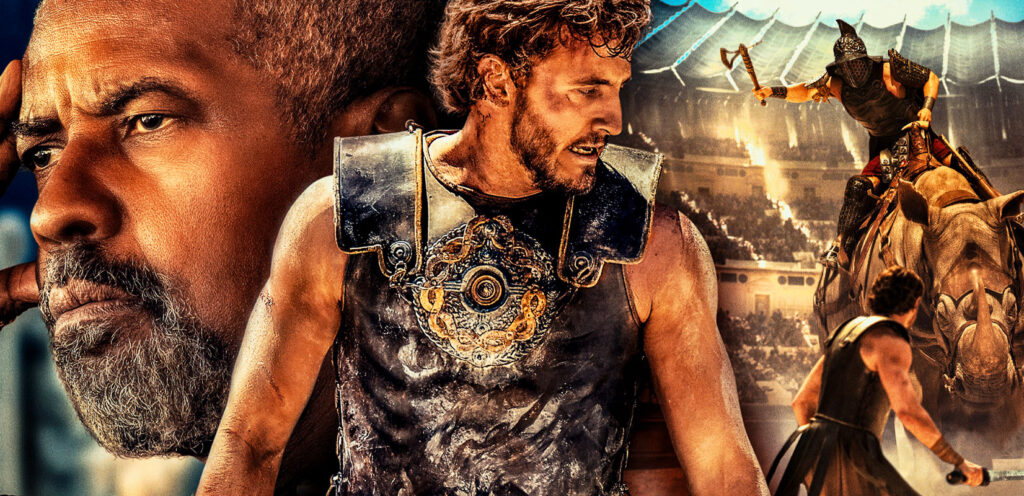Ridley Scott has long been a master of historical epics, and Gladiator is considered one of the genre’s defining achievements. The film set a high bar, blending intense battle scenes, powerful performances, and a simple yet gripping story about revenge and redemption. Nearly 24 years later, Scott returns to ancient Rome with Gladiator II. But does it rise to the challenge?
For better or worse, Gladiator II echoes the formula of the first film—only with extra steps. Where Gladiator can be described through the film’s tagline (“The general who became a slave. The slave who became a gladiator. The gladiator who defied an empire”), this sequel explores more of Rome’s complex political landscape. All this while we follow Lucius, who’s now grown up and navigating his path in a tumultuous empire. While attempts to expand the narrative with political intrigue are ambitious, they stretch the storyline to the point where it feels like it’s gone on for too long.
Characterization, unfortunately, is another of the film’s issues. Most characters come across as flat and one-dimensional despite David Scarpa’s multiple attempts to give them depth. The problem stems partly from the performances and the rest from the script itself. The most notable exception is Denzel Washington’s character, Macrinus. Washington delivers a complex performance reminiscent of his iconic roles like Alonzo Harris in Training Day or Lt. Commander Hunter in Crimson Tide. Like those characters, he channels charm, intensity, and moral ambiguity. His scenes are compelling, and he lifts the film whenever he’s present.
Gladiator II is an ambitious but uneven sequel that struggles to balance its expanded narrative with the magic fans remember from the original.
On the other hand, while Paul Mescal is a talented actor, he doesn’t command the screen like Russell Crowe did as Maximus. Mescal’s portrayal of Lucius is competent yet lacking in the charismatic authority that defined Maximus. Similarly, Pedro Pascal’s portrayal of the Roman general Marcus Acacius is nuanced and believable in his role. However, his performance doesn’t quite reach the magnetic level needed to elevate his character beyond the script’s limitations. Both actors are held back by dialogue that feels too restrained for a story set in such a chaotic time.
Despite its flaws, Gladiator II does have its strengths. Scott’s direction ensures the film is visually captivating. Much like the original, the meticulous attention to historical detail in costumes and sets is outstanding. Plus, the gladiatorial battles are creatively fun and exciting. Admittedly, they’re over-the-top, but that’s also why they’re so much fun. Harry Gregson-Williams’s score, though less iconic than Hans Zimmer’s work in the original, is still effective, underscoring the film’s more intense and emotional moments.
Overall, Gladiator II is an ambitious but uneven sequel that struggles to balance its expanded narrative with the magic fans remember from the original. While it may lack the perfection of the original, Gladiator II offers enough intrigue and spectacle to make it worth a watch—but like the empire it portrays, this sequel feels burdened by its ambitions.
Rating: 3.5/5 atoms

Gladiator II hits theaters on November 22nd.







